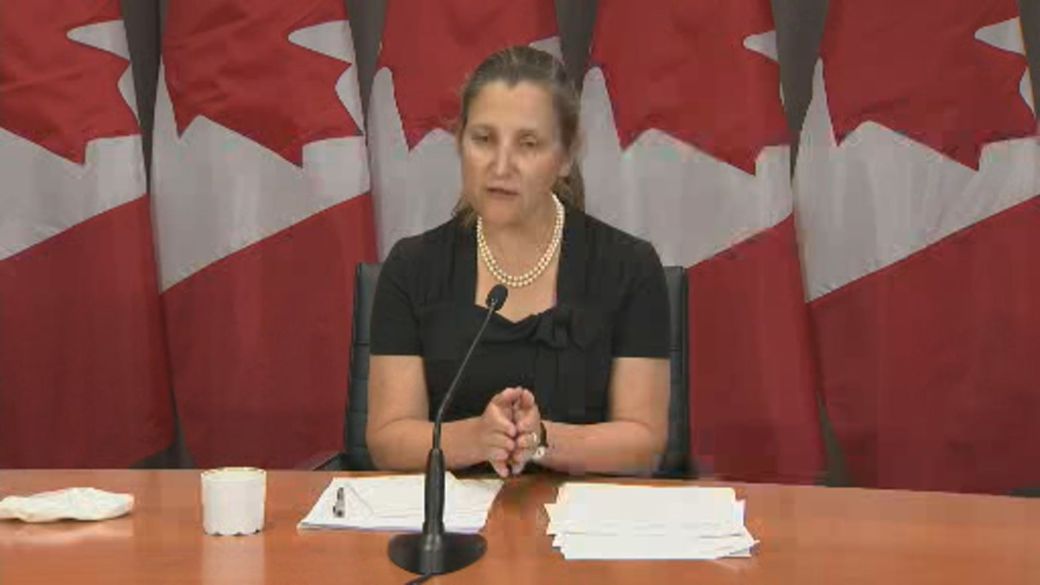Canada Defends Tariff Stance Against Oxford Report Criticism

Table of Contents
The Oxford Report's Key Criticisms of Canada's Tariffs
The Oxford report, released [insert date], presents a detailed analysis of Canada's recent tariff policies, arguing that they are detrimental to economic growth and international trade cooperation. The report's core criticisms include:
- Negative Impact on Specific Industries: The report claims that the tariffs disproportionately impact certain sectors of the Canadian economy, hindering their competitiveness and potentially leading to job losses. Specific examples cited include [mention specific industries and quantify the negative impact if possible, citing the report].
- Violation of Trade Agreements: The Oxford report alleges that some of Canada's tariffs violate existing trade agreements, potentially leading to retaliatory measures from trading partners and undermining Canada's reputation as a reliable and predictable trading partner. The report highlights potential violations of [mention specific trade agreements, e.g., CUSMA/USMCA, WTO agreements].
- Lack of Transparency: The report criticizes the lack of transparency surrounding the decision-making process behind the imposition of these tariffs, arguing that the lack of clear justification undermines public trust and accountability. The report suggests that the process lacked sufficient consultation with stakeholders and failed to provide a clear rationale for the chosen tariff levels.
These criticisms are supported by statistical data presented in the Oxford report, detailing the predicted economic losses and potential disruptions to various sectors. The report’s findings clearly point towards a negative impact of the Canadian tariffs on both the domestic economy and international trade relationships, challenging the government’s justification for these policies.
Canada's Response and Justification of its Tariff Policies
The Canadian government has responded to the Oxford report's criticisms with a staunch defense of its tariff policies. The government maintains that the tariffs are necessary to:
- Protect Domestic Industries: Officials argue that the tariffs are essential for safeguarding vulnerable domestic industries from unfair competition, citing instances of [mention specific examples of unfair trade practices, such as dumping or subsidies]. They maintain that these protective measures are crucial for preserving jobs and maintaining economic stability.
- Respond to Unfair Trade Practices: The government insists that the tariffs are a legitimate response to unfair trade practices employed by other countries, highlighting specific examples where [mention specific examples]. This, they argue, levels the playing field and promotes fair competition.
- Address National Security Concerns: In some cases, the government emphasizes that the tariffs are implemented to protect national security interests, particularly concerning [mention specific sectors related to national security, e.g., critical infrastructure, defense industries].
The Canadian government’s response underscores its commitment to protecting domestic industries and upholding fair trade practices. However, critics argue that the government's justification lacks sufficient evidence and that the economic costs outweigh the benefits.
Analysis of Competing Arguments and Economic Data
Analyzing the competing arguments requires a careful examination of the economic data presented by both the Oxford report and the Canadian government. While the Oxford report highlights potential negative consequences, the government emphasizes the benefits of protecting domestic industries and responding to unfair trade practices.
A balanced perspective requires considering:
- Comparative Advantage: An assessment of whether the protected industries possess a genuine comparative advantage or if the tariffs are merely delaying necessary economic adjustments.
- Trade Data Analysis: A thorough analysis of trade data before and after the tariff implementation is crucial to assess its actual impact on the affected sectors and the broader economy.
- Alternative Perspectives: Exploring alternative policy solutions, such as targeted support for struggling industries instead of broad tariffs, is essential for a comprehensive analysis.
The debate hinges on the interpretation of economic data and the weight given to various factors. A conclusive assessment requires further investigation and analysis beyond the scope of this initial overview.
International Implications and Reactions
The Oxford report and Canada's response have drawn significant international attention, prompting reactions from various countries and international organizations. [Mention specific reactions from other countries or international organizations, such as the WTO or other trading partners]. These international reactions underscore the global implications of Canada's tariff policy and the potential for escalating trade tensions. The potential for retaliatory tariffs or trade disputes adds another layer of complexity to this already contentious issue.
Future Outlook and Potential Impacts on Canadian Trade
The ongoing debate surrounding Canada's tariff stance will likely have long-term implications for Canadian trade relations. Maintaining the current policies could lead to:
- Escalation of Trade Disputes: Further retaliatory measures from trading partners are a distinct possibility.
- Reduced Economic Growth: Continued protectionist policies may stifle innovation and reduce overall economic growth.
- Damage to International Reputation: The controversy could damage Canada's reputation as a reliable and predictable trading partner.
Conversely, revising the tariff policies could lead to:
- Improved Trade Relations: A more conciliatory approach could lead to improved relationships with trading partners.
- Increased Economic Opportunities: Opening markets could lead to increased economic opportunities for Canadian businesses.
- Strengthened International Cooperation: A commitment to multilateral trade agreements could strengthen international cooperation and promote global economic stability.
The future trajectory of Canada's trade policy will depend on various factors, including domestic political considerations, international pressure, and the evolving economic landscape.
Conclusion: Canada's Tariff Stance: A Continuing Debate
The debate surrounding Canada's tariff stance remains fiercely contested. The Oxford report's critical analysis highlights potential negative economic consequences and challenges the government's justification. Conversely, the Canadian government defends its policies, emphasizing the need to protect domestic industries and respond to unfair trade practices. The key points of contention center on the economic impact of the tariffs, their compliance with trade agreements, and the overall transparency of the decision-making process. The ongoing debate necessitates further research and informed discussion.
To stay informed about this evolving situation and engage in informed discussions, we encourage you to consult the following resources: [Insert links to the Oxford report, relevant government websites, and news articles]. Understanding the complexities of Canada’s tariff policies is crucial for shaping a responsible and effective trade strategy for the future. Stay informed, stay engaged, and help shape the conversation around Canada's tariff stance.

Featured Posts
-
 Understanding The Humor And Heart Of The Goldbergs
May 21, 2025
Understanding The Humor And Heart Of The Goldbergs
May 21, 2025 -
 Nieuwe Directeur Hypotheken Bij Abn Amro Florius En Moneyou Welkom Karin Polman
May 21, 2025
Nieuwe Directeur Hypotheken Bij Abn Amro Florius En Moneyou Welkom Karin Polman
May 21, 2025 -
 Benjamin Kaellman Huuhkajien Uusi Taehti Maalivire Ja Kehitys Kentillae Ja Niiden Ulkopuolella
May 21, 2025
Benjamin Kaellman Huuhkajien Uusi Taehti Maalivire Ja Kehitys Kentillae Ja Niiden Ulkopuolella
May 21, 2025 -
 Financiele Risico S Abn Amro Analyseert De Afhankelijkheid Van Goedkope Arbeidsmigranten In De Voedingsindustrie
May 21, 2025
Financiele Risico S Abn Amro Analyseert De Afhankelijkheid Van Goedkope Arbeidsmigranten In De Voedingsindustrie
May 21, 2025 -
 Whats Next For Sydney Sweeney After Echo Valley And The Housemaid Her New Film Role Revealed
May 21, 2025
Whats Next For Sydney Sweeney After Echo Valley And The Housemaid Her New Film Role Revealed
May 21, 2025
